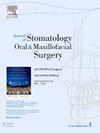Diagnostic value of 99mTc-MDP single-photon emission computed tomography/computed tomography in medication-related osteonecrosis of the jaw: A single-center retrospective study of 39 patients
IF 1.8
3区 医学
Q2 DENTISTRY, ORAL SURGERY & MEDICINE
Journal of Stomatology Oral and Maxillofacial Surgery
Pub Date : 2025-01-23
DOI:10.1016/j.jormas.2025.102262
引用次数: 0
Abstract
Objective
The focus of this study was to assess the diagnostic effectiveness of 99mTc-MDP single-photon emission computed tomography/computed tomography (SPECT/CT) in pinpointing medication-related osteonecrosis of the jaw (MRONJ).
Methods
We gathered a total of 39 patients who were suspected of having MRONJ and displayed radionuclide concentration in the jaws on whole-body bone scans. These patients were subjected to simultaneous SPECT/CT fusion imaging of the jaws during delayed imaging. A consistent team of nuclear medicine physicians and oral and maxillofacial surgeons carried out diagnostic evaluations using SPECT/CT image analysis and dental specialist examinations, and the diagnoses were documented.
Results
Based on the SPECT/CT image analysis and dental specialist examination outcomes, we calculated the sensitivity, specificity, accuracy, positive predictive value, and negative predictive value of 99mTc-MDP SPECT/CT in diagnosing suspected MRONJ. Further, we enumerated the number and proportion of patients at each stage.
Conclusion
Our findings suggest that 99mTc-MDP SPECT/CT demonstrates high diagnostic precision in patients suspected of MRONJ who display radionuclide concentration in the jaw on whole-body bone scans. Moreover, it proves beneficial in identifying the early stages of MRONJ.
99mTc-MDP单光子发射计算机断层扫描/计算机断层扫描对颌骨药物相关性骨坏死的诊断价值:39例患者的单中心回顾性研究。
研究目的本研究的重点是评估99m锝-MDP单光子发射计算机断层扫描/计算机断层扫描(SPECT/CT)在确定药物相关性颌骨坏死(MRONJ)方面的诊断效果:我们共收集了39名疑似MRONJ患者,这些患者的全身骨扫描显示颌骨中存在放射性核素浓度。这些患者在延迟成像期间接受了颌骨同步 SPECT/CT 融合成像。由核医学医生和口腔颌面外科医生组成的医疗小组利用 SPECT/CT 图像分析和牙科专家检查进行诊断评估,并将诊断结果记录在案:根据 SPECT/CT 图像分析和牙科专家检查的结果,我们计算了 99mTc-MDP SPECT/CT 诊断疑似 MRONJ 的敏感性、特异性、准确性、阳性预测值和阴性预测值。此外,我们还统计了每个阶段的患者人数和比例:我们的研究结果表明,99m锝-MDP SPECT/CT 对全身骨扫描显示放射性核素在颌骨聚集的 MRONJ 疑似患者具有很高的诊断精确度。此外,它还有助于识别 MRONJ 的早期阶段。
本文章由计算机程序翻译,如有差异,请以英文原文为准。
求助全文
约1分钟内获得全文
求助全文
来源期刊

Journal of Stomatology Oral and Maxillofacial Surgery
Surgery, Dentistry, Oral Surgery and Medicine, Otorhinolaryngology and Facial Plastic Surgery
CiteScore
2.30
自引率
9.10%
发文量
0
审稿时长
23 days
 求助内容:
求助内容: 应助结果提醒方式:
应助结果提醒方式:


